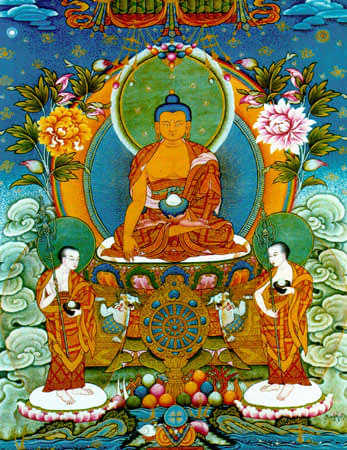Library - Tengyur - Comments on tantras

śrī-mahākāla-sādhana
The Practice of Glorious Mahakala
I prostrate before the glorious protector Mahakala!
Throuhg the sequence that was proclaimed earlier in the appropriate manner, perform meditation on emptiness. After that, on a multicolored lotus and the Sun, the black syllable hūṁ [appears]. When it becomes perfect, it [transforms into] the glorious noble Mahakala. He has one face and two arms. His body is black, with three eyes blazing with power. His right and left hands hold a cutting dagger and a kapala. His body is adorned with a necklace of garlands made of human heads. Red and yellow hair rises up from the top of his head. His fangs are clenched. He appears terrifying. His entire body is adorned with snakes. His body is small in size. Blood drips from his mouth. Instantly giving rise to yourself, recite the mantra. This is the mantra for this:
oṁ mahākāla hūṁ hūṁ phaṭ phaṭ svāhā
Offer Mahakala incense made from poison, blood, garlic, and mustard. After offering it, make offerings to Mahakala with iron hook nectar, [made] from beans, peas, jambu tiga, wine, flowers, and five ointments.
[Make the offering] with this mantra torma:
oṁ mahākālāya śāsana upa hāriṇi eṣa paṣci makālo a yaṁ i daṁ ratna traya apa kāri ṇaṁ yadi pratījñā smara sitadā i daṁ duṣṭa kha kha khāhi khāhi mara mara gṛihṇa gṛihṇa bandha bandha hana hana daha daha paca paca dina mekena māraya hūṁ hūṁ phaṭ phaṭ
Make the form of the one for whom the practice is performed out of three burning ones. Fill the body with thorns. Smear it with poison and black mustard according to the ritual. Having done so, burn it in the fire. [Having done] this together with any of the names, you will instantly see the corresponding result. If the acharya is constantly filled with anger and rage, or if someone harms the Three Jewels and boundless living beings, Mahakala will eat all of it. He will cut the flesh from their bodies and drink their blood accordingly. Make a circle on the top of your head and recite with great devotion.
This concludes the practice of the glorious Mahakala.
Translated by Lama Karma Paljor.


